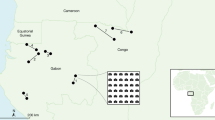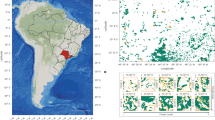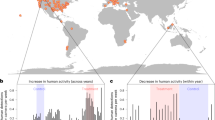Abstract
LEKS, on which males defend small clustered mating territories, may have evolved because of the unusual opportunities they provide for female choice of mating partners1-4, and several studies of lek-breeding animals have demonstrated correlations between the mating success of males and their phenotype or behaviour5-7. However, these could arise because (1) females select mates on the basis of male phenotypic traits1-4; (2) males interfere with each other's mating attempts4,8,9; or (3) females show preferences for particular mating territories, and larger or stronger males are more likely to win access to these territories4,10-12. Here we report that when fallow bucks on a traditional lek were experimentally induced to change their territories, differences in the mating success of bucks persisted, whereas differences in the position of their territories relative to the centre of the lek did not. The observation that bucks rarely interfered with their neighbours harems and females moved freely between bucks suggests that females choose their mates on the basis of male phenotype rather than territory type or location. In this population, the immediate factor affecting the movements of females between males was the size of a buck's harem.
This is a preview of subscription content, access via your institution
Access options
Subscribe to this journal
Receive 51 print issues and online access
$199.00 per year
only $3.90 per issue
Buy this article
- Purchase on Springer Link
- Instant access to full article PDF
Prices may be subject to local taxes which are calculated during checkout
Similar content being viewed by others
References
Alexander, R. D. In Insects, Science and Society (ed. Pimental, D.) 35–77 (Academic, New York, 1975).
Bradbury, J. W. in Natural Selection and Social Behavior (eds Alexander, R. D. & Tinkle, D.) 138–169 (Chiron, New York, 1981).
Queller, D. C. Anim. Behav. 35, 1424–1432 (1982).
Bradbury, J. W. & Gibson, R. in Mate Choice (ed. Bateson, P.) 109–138. (Cambridge University Press, 1983).
Gibson, R. & Bradbury, J. W. Behavl. Ecol. Sociobiol. 18, 117–123 (1965).
Kruijt, J. P. & de Vos, G. J. in Reproductive Success (ed. Clutton-Brock, T. H.) 279–291 (University of Chicago Press, 1988).
Clutton-Brock, T. H., Green, D., Hiraiwa-Hasegawa, M. & Albon, S. D. Behavl. Ecol. Sociobiol. 23, 281–296 (1988).
Diamond, J. M. Nature 298, 257–258 (1981).
Foster, M. S. Am. Nat. 122, 53–72 (1983).
Warner, R. R. Anim. Behav. 35, 1470–1478 (1987).
Warner, R. R. Nature 335, 719–721 (1988).
Appollonio, M., Festa-Bianchet, M., Mari, F. & Riva, M. Anim. Behav. (in the press).
Schaal, A. C.r. Acad. Sci., Paris Series III no. 18, 729–732 (1986).
Bradbury, J. W., Vehrencamp, S. & Gibson, R. in Evolution: Essays in Honour of John Maynard Smith (eds Greenwood, P. J., Harvey, P. H. & Slatkin, M.) 301–314 (Cambridge University Press, 1985).
Author information
Authors and Affiliations
Rights and permissions
About this article
Cite this article
Clutton-Brock, T., Hiraiwa-Hasegawa, M. & Robertson, A. Mate choice on fallow deer leks. Nature 340, 463–465 (1989). https://doi.org/10.1038/340463a0
Received:
Accepted:
Issue Date:
DOI: https://doi.org/10.1038/340463a0
This article is cited by
-
Brains vs Brawn: Relative brain size is sexually dimorphic amongst weapon-bearing ruminants
Behavioral Ecology and Sociobiology (2024)
-
Female mating tactics in lekking fallow deer (Dama dama): experience explains inter-individual variability more than costs
Scientific Reports (2020)
-
I Want What She’s Having
Human Nature (2014)
-
Fighting behaviour as a correlate of male mating success in black grouse Tetrao tetrix
Behavioral Ecology and Sociobiology (2012)
-
Queuing in space and time reduces the lek paradox on an antelope lek
Evolutionary Ecology (2011)
Comments
By submitting a comment you agree to abide by our Terms and Community Guidelines. If you find something abusive or that does not comply with our terms or guidelines please flag it as inappropriate.



